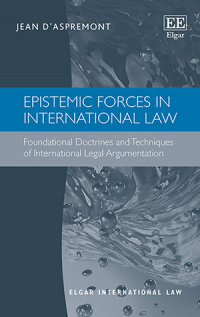Hardback
Epistemic Forces in International Law
Foundational Doctrines and Techniques of International Legal Argumentation
9781781955277 Edward Elgar Publishing
Epistemic Forces in International Law examines the methodological choices of international lawyers through considering theories of statehood, sources, institutions and law-making. From this examination, Jean d''Aspremont presents a discerning insight into the way in which international lawyers shape their arguments to secure validation within the international law community.
More Information
Critical Acclaim
Contributors
Contents
More Information
Epistemic Forces in International Law presents a comprehensive examination of the methodological choices made by international lawyers and provides a discerning insight into the ways in which lawyers shape their arguments to secure validation within the international legal community.
International law is defined in this book as an argumentative practice, articulated around a set of foundational doctrines and deployed through rhetorical techniques. Taking an original approach, Jean d’Aspremont focuses on five key foundational doctrines of international legal theory and five key techniques deployed in international legal argumentation. He argues that mastering these foundational principles and argumentative procedures shapes the discourse of international lawyers as much as these discourses shape these foundational doctrines and techniques of legal argumentation. This book is a pertinent contribution to the methodology and theory of international law, illustrating the rationale of the choices made by lawyers in the doctrines of statehood, sources, law-making, international organisations and effectivity.
This accessible reflection on the conceptual, theoretical and methodological perspectives of international law will be a salient point of reference for legal academics, researchers and practitioners alike.
International law is defined in this book as an argumentative practice, articulated around a set of foundational doctrines and deployed through rhetorical techniques. Taking an original approach, Jean d’Aspremont focuses on five key foundational doctrines of international legal theory and five key techniques deployed in international legal argumentation. He argues that mastering these foundational principles and argumentative procedures shapes the discourse of international lawyers as much as these discourses shape these foundational doctrines and techniques of legal argumentation. This book is a pertinent contribution to the methodology and theory of international law, illustrating the rationale of the choices made by lawyers in the doctrines of statehood, sources, law-making, international organisations and effectivity.
This accessible reflection on the conceptual, theoretical and methodological perspectives of international law will be a salient point of reference for legal academics, researchers and practitioners alike.
Critical Acclaim
‘To whom does international law belong? International lawyers have shaped our understanding of the nature as well as of the content of the discipline to an unusually high degree. This book explores this phenomena, probing the nature of the community of international lawyers that engage in this practice, its causes, consequences and the means through which it is accomplished. It is replete with thought-provoking insights into why we understand international law in the way that we do and, as a result, seeks to open the space for new understandings to emerge.’
– Malcolm D. Evans, University of Bristol, UK
‘Law does not have the seamless consistency of mathematics or moral philosophy; and lawyers need to be aware of its limitations. Many lawyers have quoted Emerson''s great dictum that ''foolish consistency is the hobgoblin of little minds'', but few have had the courage to act on it. Here, d''Aspremont offers a principled defence of a position that is not only the unavoidable fate of the international lawyer but also the best hope for the rational development of international law.’
– Vaughan Lowe, Oxford University, UK
‘Jean d''Aspremont is one of the more thoughtful and creative international legal academics of his generation. In this volume of essays, he aims to explore how the ''invisible college of international lawyers'' (to use a famous phrase) works, based on the idea that insight into the way international lawyers work will also tell us something of great value about international law itself. The result is sometimes compelling, sometimes controversial, and invariably thought-provoking: a must-read for the self-reflective international lawyer.’
– Jan Klabbers, University of Helsinki, Finland
– Malcolm D. Evans, University of Bristol, UK
‘Law does not have the seamless consistency of mathematics or moral philosophy; and lawyers need to be aware of its limitations. Many lawyers have quoted Emerson''s great dictum that ''foolish consistency is the hobgoblin of little minds'', but few have had the courage to act on it. Here, d''Aspremont offers a principled defence of a position that is not only the unavoidable fate of the international lawyer but also the best hope for the rational development of international law.’
– Vaughan Lowe, Oxford University, UK
‘Jean d''Aspremont is one of the more thoughtful and creative international legal academics of his generation. In this volume of essays, he aims to explore how the ''invisible college of international lawyers'' (to use a famous phrase) works, based on the idea that insight into the way international lawyers work will also tell us something of great value about international law itself. The result is sometimes compelling, sometimes controversial, and invariably thought-provoking: a must-read for the self-reflective international lawyer.’
– Jan Klabbers, University of Helsinki, Finland
Contributors
Contents
Contents: PART I THE FOUNDATIONAL DOCTRINES 1. Subjects 2. Sources 3. Law-making 4. Institutions 5. Effectivity PART II THE ARGUMENTATIVE TECHNIQUES 6. Methodology 7. Interpretation 8. Academic Writing 9. Dissemination 10. Expert Blogging Index




